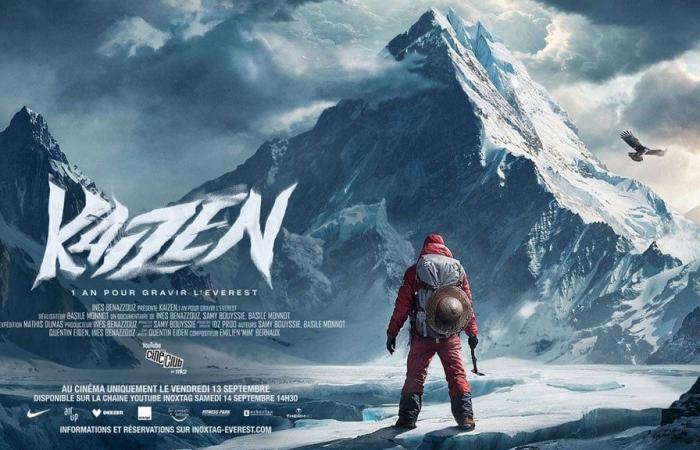“Kaizen: 1 year to climb Everest”, the documentary by YouTuber Inoxtag dedicated to his ascent of Everest, is a huge success. On YouTube, the footage has accumulated over 20 million views in the space of a few days. The documentary is also enjoying great popularity in cinemas. Last Friday, more than 300,000 French people rushed to the cinema to discover Kaizen on the big screen. The film’s footage convinced TF1 to buy the broadcast rights for the documentary. It will be broadcast on Tuesday, October 8, 2024 at 11:30 p.m. on TF1. In addition, Inoxtag’s film will be released on the TF1 + platform from September 28, 2024.
Also read: How the dubbing world is trying to stem its “plunder” by AI
A violation of media chronology
As reported by our colleagues at 20Minutes, the success of Kaizen blurs the boundaries between digital platforms, such as YouTube, and traditional media, such as TF1 and cinemas. In the process, the documentary especially violates the famous media chronology.
In France, a specific legal framework called “media chronology” controls the distribution schedule of films according to the media. The legislation imposes mandatory deadlines between the release of a film in theaters and its distribution on television channels or video-on-demand platforms. This regulation, inherited from the 1980s, applies to film distributors, cinema operators, streaming services and TV channels.
Interviewed by 20Minutes, Olivier Henrard, the deputy general director and interim president of the National Center for Cinema and the Animated Image (CNC), emphasizes that the broadcast of Kaizen on TF1 just a few weeks after its release in cinemas constitutes an offence. The new media chronology framework, in force since 2022, provides that a film released in cinemas must wait 22 months before arriving on a free channel, such as TF1. The president of the CNC specifies that this “the calendar had been defined in consultation with the members of the profession so that everyone could benefit from it”.
The limit of 500 sessions
To avoid the regulatory deadline, the distributor of Kaizen, namely the Parisian group MK2, should have limited the number of screenings in France. The film has in fact a visa for exceptional screenings. However, “The concern is that Kaizen could create an unfortunate precedent, since the distributor MK2 has clearly and knowingly exceeded the limit of 500 sessions, a limit which is the result of consultation with the sector”notes Olivier Henrard. The timeline in fact allows distributors to organize no more than 500 sessions in two days to escape the classic broadcasting deadline. This is the limit threshold set by Article R. 211-45 of the French Cinema Code, which describes the conditions to be met to obtain a visa for exceptional screenings. In this case, the limit was largely exceeded. In fact, the distributors were “taken by surprise” by the success of Kaizen. This is why the number of sessions has been revised upwards, despite the limit set.
For having exceeded the limit provided for by the visa granted to Kaizen, the distributor MK2 risks a fine of 45,000 euros. In addition, the French Cinema Code provides for a wide range of possible administrative sanctions, including a fine equivalent to “3% of the turnover excluding tax achieved during the last financial year calculated over a period of twelve months”.
Under these conditions, the CNC says it is ready to “think again about this regulation”The National Center for Cinema and the Animated Image wants to prevent “the cinema does not become an accessory, and perhaps consider more dissuasive sanctions”. It is not impossible that the Kaizen affair will push regulators to decree harsher sanctions to prevent abuses. For the CNC leader, “These exceptional sessions, which are an essential breath of fresh air and which must be preserved, must not, however, call into question the balance of the sector”.
Cinema as a means of showing off
Above all, cinema must not become a simple springboard for digital platforms accessible for free on the Internet. This is the fear expressed by cinema owners. For Gérard Lemoine, the director of Cinépal, a cinema in Palaiseau in the Île-de-France region, cinema must not become “a launch pad or promotion for free or paid platforms” and only serves as “promoting other modes of diffusion”.
???? To not miss any news from 01net, follow us on Google News and WhatsApp.
Source :
20Minutes






